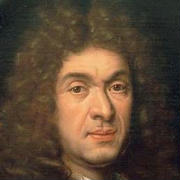Marc-Antoine Charpentier (French: [maʁk ɑ̃twan ʃaʁpɑ̃tje]; 1643 – 24 February 1704) was a French Baroque composer during the reign of Louis XIV. One of his most famous works is the main theme from the prelude of his Te Deum, Marche en rondeau. This theme which is still used today as a fanfare during television broadcasts of the Eurovision Network, the European Broadcasting Union. The most relevant broadcast program it transmits is the Eurovision Song Contest.
Marc-Antoine Charpentier dominated the Baroque musical scene in seventeenth century France because of the quality of his prolific output. He mastered all genres, and his skill in writing sacred vocal music was especially hailed by his contemporaries.
He began his career by going to Italy, there he fell under the influence of Giacomo Carissimi as well as other Italian composers, perhaps Domenico Mazzocchi. He would remain marked by the Italian style and become the only one with Jean-Joseph Cassanéa de Mondonville in France to approach the oratorio. In 1670, he became a master of music (composer and singer) in the service of the Duchess of Guise. From 1690 Charpentier composed Médée, on a piece by Corneille. It would be a determining failure in his career of composer: he devoted himself henceforth to the religious music. He became the composer of the Carmelites of Rue du Bouloir, Montmartre Abbey, Abbaye-aux-Bois and Port-Royal. In 1698, Charpentier was appointed music master for the children of the Sainte-Chapelle du Palais. After having obtained from the king Louis XIV a softening of Lully's monopoly, Molière turned to Charpentier to compose the music for the intermissions of Circe and Andromeda, as well as sung scenes for the revivals of The Forced Marriage, and finally the musical pieces of The Imaginary invalid.
He composed secular works, stage music, operas, cantatas, sonatas, symphonies, as well as sacred music, motets (large or small), oratorios, masses, psalms, Magnificats, Litanies.
At his death, Charpentier's complete works must have numbered about 800 opus numbers, but today only 28 autograph volumes remain, or more than 500 pieces that he himself took care to classify. This collection, called Mélanges, is one of the most comprehensive sets of musical autograph manuscripts of all time.








